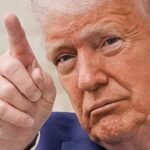The Trump administration’s unprecedented and unpredictable import taxes on goods and materials coming into the United States, which have sewn chaos both domestically and internationally for months, are illegal. That’s according to the Court of International Trade, which found Trump’s invocation of the Emergency Powers Act mostly invalid.
Update: ….and it’s gone. Less than 24 hours later, a federal appeals court has granted Trump administration’s request to suspend the Court of International Trade’s ruling while the appeal proceeds. The original story continues below.
The three-judge panel ruled after several lawsuits questioned the president’s authority to unilaterally enact economic policy without the involvement of Congress, which is supposed to pass new laws to govern the US federal budget. The Trump adminstration’s claim, that trade deficits—a normal and expected part of any economy that trades globally—constitute an “emergency” and thus grant the president authority beyond the executive branch’s normal scope, has been rejected.
Not all of Trump’s tariffs are immediately invalidated, according to the report from the Associated Press. A 15 percent import tax on some countries for up to 150 days, and 25 percent on auto parts, imported raw materials like steel and aluminum, may still be valid due to executive powers from other laws passed in 1962 and 1974. But the current tariff rates—10 percent on most countries and 30 percent on China (down from an incredible 145 percent at the height of back-and-forth squabbling between the two countries)—appear to be invalid.
Of course, that’s not the end of the story. The Trump administration will almost certainly appeal the ruling, up to the US Supreme Court if necessary, to find a more favorable conclusion. And with a firm majority of conservative-leaning justices, two of which were hand-picked by Trump during his previous administration, decisions have tended to lean in favor of granting him sweeping and highly specific authority. Determining what tariffs remain in place, where they’re collected, and who pays when importing goods and materials, will probably cause headaches both before and after a final ruling is made.
Trump’s import taxes have caused uncertainty across more or less every sector of the economy that sells goods to Americans. From car giants and laptop manufacturers, to retailers like Amazon and Walmart (not to mention those that rely on direct shipping from China like Temu), to boutique PC makers like iBuyPower, to small local repair shops, hardly any part of the electronics industry is unaffected. Uncertainty around the source and price of essential goods has had a chilling effect, though weirdly, the short-term impact on PC shipments has been positive as both suppliers and buyers rush to upgrade before prices rise too much higher.
The Trump administration’s unprecedented and unpredictable import taxes on goods and materials coming into the United States, which have sewn chaos both domestically and internationally for months, are illegal. That’s according to the Court of International Trade, which found Trump’s invocation of the Emergency Powers Act mostly invalid.
Update: ….and it’s gone. Less than 24 hours later, a federal appeals court has granted Trump administration’s request to suspend the Court of International Trade’s ruling while the appeal proceeds. The original story continues below.
The three-judge panel ruled after several lawsuits questioned the president’s authority to unilaterally enact economic policy without the involvement of Congress, which is supposed to pass new laws to govern the US federal budget. The Trump adminstration’s claim, that trade deficits—a normal and expected part of any economy that trades globally—constitute an “emergency” and thus grant the president authority beyond the executive branch’s normal scope, has been rejected.
Not all of Trump’s tariffs are immediately invalidated, according to the report from the Associated Press. A 15 percent import tax on some countries for up to 150 days, and 25 percent on auto parts, imported raw materials like steel and aluminum, may still be valid due to executive powers from other laws passed in 1962 and 1974. But the current tariff rates—10 percent on most countries and 30 percent on China (down from an incredible 145 percent at the height of back-and-forth squabbling between the two countries)—appear to be invalid.
Of course, that’s not the end of the story. The Trump administration will almost certainly appeal the ruling, up to the US Supreme Court if necessary, to find a more favorable conclusion. And with a firm majority of conservative-leaning justices, two of which were hand-picked by Trump during his previous administration, decisions have tended to lean in favor of granting him sweeping and highly specific authority. Determining what tariffs remain in place, where they’re collected, and who pays when importing goods and materials, will probably cause headaches both before and after a final ruling is made.
Trump’s import taxes have caused uncertainty across more or less every sector of the economy that sells goods to Americans. From car giants and laptop manufacturers, to retailers like Amazon and Walmart (not to mention those that rely on direct shipping from China like Temu), to boutique PC makers like iBuyPower, to small local repair shops, hardly any part of the electronics industry is unaffected. Uncertainty around the source and price of essential goods has had a chilling effect, though weirdly, the short-term impact on PC shipments has been positive as both suppliers and buyers rush to upgrade before prices rise too much higher. Business, Technology Industry PCWorld





















































































































